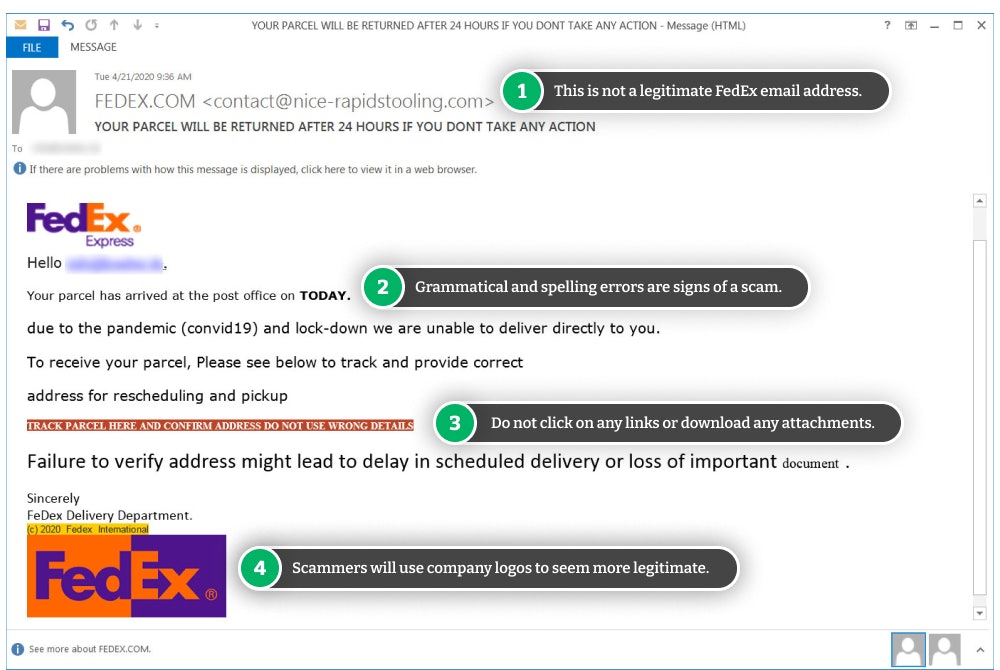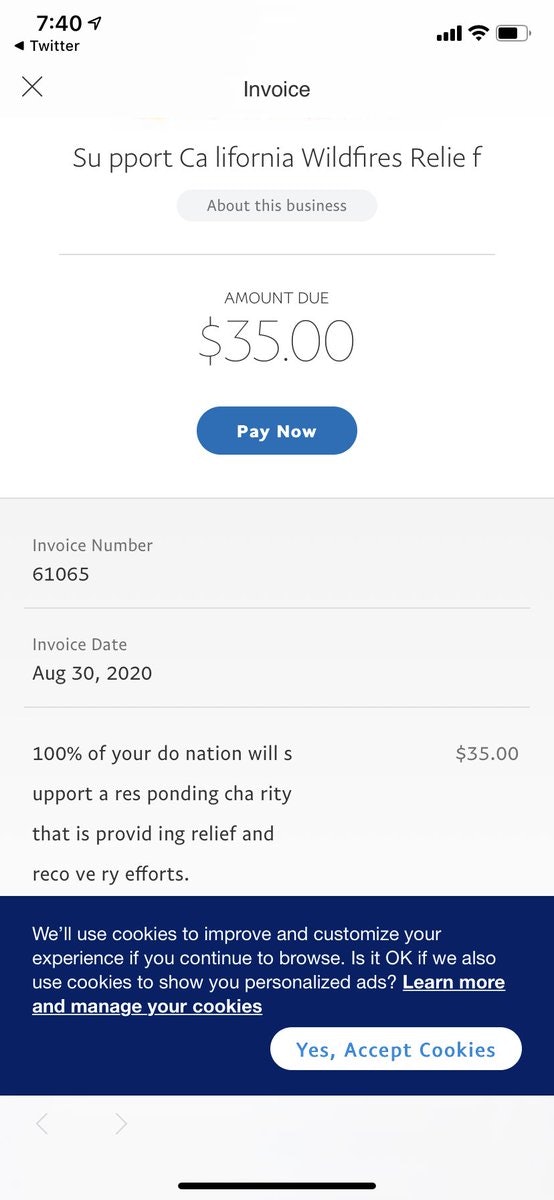- Social Media Gift Exchanges
- Fake Shipping Notification Scams
- Fake Charities (Common Holiday Scams)
- Online Puppy Scams
- Gift Card Holiday Scams
- What to Do If You’ve Fallen for Holiday Scams
- Frequently Asked Questions
‘Tis the season for celebrations, giving, gatherings with loved ones…and holiday scams. With the increase of online shopping and payments made via the web during the holidays, it's essential to be on the lookout for scammers trying to steal your information and money.
In a study done by Experian in 2020, nearly a quarter (1 in 4) of survey respondents reported falling victim to fraud during the holidays. Further, non-payment or non-delivery scams cost consumers more than $265 million last year according to the Internet Crime Complaint Center’s (IC3) report.
- Non-payment scams: These involve shipped goods or services in which the seller is never paid.
- Non-delivery scams: These occur when a buyer pays for online goods or services, but those items are never received.
To beat holiday scams and avoid having your festivities ruined, here are five of the most common types of scams to watch out for this season.
Social Media Gift Exchanges
Social media gift exchanges can have a variety of names including the “secret sister gift exchange,” “holiday gift exchange,” or simply “gift exchange.” The scam works by people finding these fake gift exchanges promoted on platforms such as Facebook, Instagram, or Reddit.
You may see a post from a scammer posing as a known friend or acquaintance. The body of the message may read something like:
Anyone want to join in on this fun?
SECRET SISTER is back! I am looking for 6 or more ladies interested in a holiday gift exchange. Doesn’t matter where you live—you are welcome to join. You have to buy one gift valued at least $10 and send it to your secret sister. You will then receive 6-36 gifts in return. This is so much fun!
I loved sending a gift to a complete stranger knowing that she would have a bright spot in her day because of it! Let me know if you’re interested, and I will send you information about your sister. Who’s with me? Just comment “I’m in.”
You’re “In”
Once you opt-in to the gift exchange, you’ll be sent instructions on where to send the gift and that you’ll need to share your own address to receive your gift as well. Unfortunately, though you may receive one gift back, it’s more common to get nothing at all and be out any money you spent on your gifted present.
Similar to a pyramid scheme, this scam works by participants recruiting more people to join in on the exchange in order to receive more gifts themselves. However, it’s likely that you won’t find six people to join you and even more rare that you won’t get anything in return.
How to Beat Secret Sister Gift Exchange Scams
The best way to beat secret sister gift exchange scams is by either not participating or only doing them amongst friends in which you know each person involved in the exchange.
Fake Shipping Notification Scams
With the pandemic creating an increase in online shopping, fake shipping notification scams are on the rise as well. In these shipping scams, you'll receive an email that looks like it's from a legitimate carrier such as FedEx, Amazon, UPS, or another shipping company.
The email will either be a confirmation of an order/shipment or will notify you of an issue with your delivery before directing you to click a link to see your order information. Once you click this link, you'll be asked to enter your login credentials and the scammers will now have access to your information and account.
These types of scams are typically phishing attempts designed to get access to your sensitive data and financial information—especially since most people use the same login credentials for many sites.
How to Beat the Shipping Notification Scams
The easiest way to beat shipping scams this holiday season is to never click on any suspicious links within carrier emails. Go directly to the carrier’s website (e.g., Amazon, FedEx) and see if any messages were sent to your account. Or call your local office directly to inquire about any delivery notifications.
Fake Charities (Common Holiday Scams)
During the holidays, it’s common for individuals to seek out charities to donate to before the year ends. While many legitimate charities accept donations via PayPal, scammers have found a way to prey on generous consumers by creating fake charities to con donors.
One such scam is the PayPal charity scam which often begins by the potential donor getting an email from someone claiming to work for a charity or you may find a Facebook page setup to accept donations to certain charities.
Within the body of the email or Facebook page, there may be a link to click on to donate via PayPal using your login credentials. You’ll then be taken to a fake charity website and will need to choose a donation amount and click the “donate” button to complete the transaction.
Once this has been completed, the scammer now has any personal information you entered into the fake website as well as any money sent to the fake charity.
How to Beat Fake Charity Scams
To beat fake charity scams, only make donations through a charity’s official website or call them directly to do so over the phone. Also, if you get an email claiming to be a legitimate charity, verify that the sender’s domain address is that of the organization and not an imposter account (e.g., [email protected] vs. [email protected]).
Online Puppy Scams
Who doesn’t want an adorable puppy as a gift this holiday season? If you’re on the hunt for the perfect fur baby for your family, beware of buying pets from private sellers online attempting to steal your money.
Puppy scams are unfortunately pretty common these days, with the BBB Scam Tracker reporting nearly 4,3000 online puppy scam cases in 2020 alone. While each scam may be unique, they do tend to follow a similar script.
Online classified websites like Craigslist or Facebook Marketplace are known for individuals selling puppies for low prices, sometimes saying price is negotiable price in the ad. When you inquire about the pup, you’ll likely get stories about why they must sell it quickly and may even seem pushy about the sale.

Scammers will also tell you they cannot meet you in person to show you the puppy but that they will ship it to you once you’ve transferred money via a non-trackable or unprotected transfer, such as Western Union, MoneyGram wire transfer, or payment apps.
After the money has gone through, you’ll no longer have access to the seller and will be left without a puppy and out the price of the dog.
How to Beat Online Puppy Scams
The best way to beat an online puppy scam is to only buy animals you’ve seen in person and never transfer money to a seller before you have the puppy in your hands. Be sure to also do a reverse image search in your browser to ensure that the one in the ad isn’t a stock photo.
Gift Card Holiday Scams
In this type of scam, fraudsters will request payment in the form of a gift card to purchase a product, service, or to donate to a charity. You may be contacted via email, phone or social media and scammers will use a variety of methods to secure your money.
This includes posing as a legitimate company, impersonating someone you know personally, alerting you to a sweepstake winning, or using a dating site to ask for a gift card in order to meet you in person.
First, you’ll be contacted by the scammers letting you know that in order to purchase their product, you’ll need to buy a specific type of gift card and send it to them instead of paying with cash or card. They’ll often be pushy at this point and will request you send them the gift card number and PIN so that they have access to the card.
At this point, they will now have the funds on the gift cards for their use and you won’t have the product you were purchasing, or the charity will be left without your donation. In all versions of this scam, you’re out of your money and won’t have a way to contact the scammer again.
How to Beat Gift Card Scams
The best way to beat gift card scams is to never pay for items, fees, bills, donations, or anything similar using gift cards. A big red flag of any scam is a request for payment in the form of gift cards.
What to Do If You’ve Fallen for Holiday Scams
If you’ve fallen for a holiday scam, don’t worry, not all is lost. There are a number of actions you can take to secure your personal information and potentially get your money back.
- Contact your bank immediately. It’s important to call your bank immediately if you feel you’ve been involved in a scam. If you clicked on a phishing link and gave up any of your financial information or wired money to a fake business, let your bank know about the fraudulent transactions. In some cases, you may be able to get your money back if your account hasn’t processed the transaction yet. Otherwise, if it’s too late, you can still dispute the payment according to the National Consumer Law Center.
- File a complaint with FTC. Filing a complaint with the FTC could help others from falling for the same scam or types of scams. Once the scam has been reported, you’ll also get helpful tips on how to avoid future scams or even how to recover your lost funds.
- Freeze your credit reports. Some phishing attempts manage to gain access to your identifying information which can be used to open new lines of credit in your name. To avoid this, place a free freeze on your credit reports so that potential creditors won’t be able to approve new credit applications.
Finally, we’ve compiled a shortlist of the most important actions you should take to protect yourself and your data online. Our 10 essential tips can secure your identity and decrease your chances of falling for holiday scams in the future.











Comments